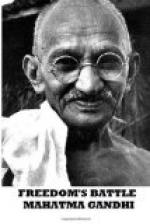And mutual toleration is a necessity for all time and for all races. We cannot live in peace if the Hindu will not tolerate the Mahomedan form of worship of God and his manners and customs or if the mahomedans will be impatient of Hindu idolatory, cow-worship. It is not necessary for toleration that I must approve of what I tolerate. I heartily dislike drinking, meat eating and smoking, but I tolerate all these in Hindus, Mahomedans and Christians even as I expect them to tolerate my abstinence from all these, although they may dislike it. All the quarrels between the Hindus and the Mahomedans have arisen from each wanting to force the other his view.
HINDU-MUSLIM UNITY
There can be no doubt that successful non-co-operation depends as much on Hindu-Muslim Unity as on non-violence. Greatest strain will be put upon both in the course of the struggle and if it survives that strain, victory is a certainty.
A severe strain was put upon it in Agra and it has been stated that when either party went to the authorities they were referred to Maulana Shaukat Ali and me. Fortunately there was a far better man at hand. Hakimji Ajmal khan is a devout Muslim who commands the confidence and the respect of both the parties. He with his band of workers hastened to Agra, settled the dispute and the parties became friends as they were never before. An incident occurred nearer Delhi and the same influence worked successfully to avoid what might have become an explosion.
But Hakimji Ajmal khan cannot be everywhere appearing at the exact hour as an angel of peace. Nor can Maulana Shankat Ali or I go everywhere. And yet perfect peace must be observed between the two communities in spite of attempts to divide them.
Why was there any appeal made to the authorities at all at Agra? If we are to work out non-co-operation with any degree of success we must be able to dispense with the protection of the Government when we quarrel among ourselves. The whole scheme of non-co-operation must break to pieces, if our final reliance is to be upon British intervention for the adjustment of our quarrels or the punishment of the guilty ones. In every village and hamlet there must be at least one Hindu and one Muslim, whose primary business must be to prevent quarrels between the two. Some times however, even blood-brothers come to blows. In the initial stages we are bound to do so here and there. Unfortunately we who are public workers have made little attempt to understand and influence the masses and least of all the most turbulent among them. During the process of insinuating ourselves in the estimation of the masses and until we have gained control over the unruly, there are bound to be exhibitions of hasty temper now and then. We must learn at such times to do without an appeal to the Government. Hakimji Ajmal Khan has shown us how to do it.




